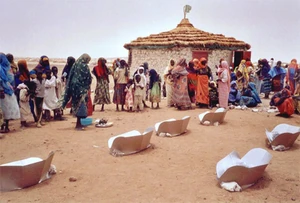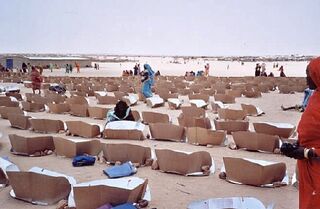Tom Sponheim (talk | contribs) |
Association (talk | contribs) m (added text from Jongbloed site) |
||
| Line 1: | Line 1: | ||
[[Image:KoZon_Iridimi_May_2007_1.jpg|right|320px]] |
[[Image:KoZon_Iridimi_May_2007_1.jpg|right|320px]] |
||
| − | The '''KoZon Foundation''' (Stichting KoZon) is a [[Netherlands|Dutch]] NGO that is working introducing solar cooking in [[Chad]], [[Burkina Faso]], [[Mali]] and [[Niger]]. |
+ | The '''KoZon Foundation''' (Stichting KoZon) is a [[Netherlands|Dutch]] NGO that is working introducing solar cooking in the Sahel:[[Chad]], [[Burkina Faso]], [[Mali]] and [[Niger]].<br> |
| + | |||
| + | In Holland the foundation called KoZon is a shortcut from the Dutch: “Koken met de Zon als warmtebron” meaning: “cooking with the energy of the sun”. We have a board of 5 persons and a couple of active advisors, we all are volunteers. |
||
| + | |||
| + | As the CooKit is the cheapest solar cooker in Africa at the moment we think that it is the best way to learn women that solar cooking is possible. It is true that it is too small for the way food is cooked for the extended Sahelian families. But in combination with an improved stove and a large haybasket, large enough for the big pots, the CooKit is useful for many dishes which can be prepared when the sun is shining. |
||
| + | |||
| + | In the refugee camps in Chad, where our advisor [[Derk Rijks]] is the project manager, small groups of about 5 to 6 people live in the tents and there the women find the CooKit a wonderful tool as it diminishes substantially their need for firewood and as well it does the cooking nicely. |
||
==Recent News== |
==Recent News== |
||
Revision as of 01:46, 25 July 2008
The KoZon Foundation (Stichting KoZon) is a Dutch NGO that is working introducing solar cooking in the Sahel:Chad, Burkina Faso, Mali and Niger.
In Holland the foundation called KoZon is a shortcut from the Dutch: “Koken met de Zon als warmtebron” meaning: “cooking with the energy of the sun”. We have a board of 5 persons and a couple of active advisors, we all are volunteers.
As the CooKit is the cheapest solar cooker in Africa at the moment we think that it is the best way to learn women that solar cooking is possible. It is true that it is too small for the way food is cooked for the extended Sahelian families. But in combination with an improved stove and a large haybasket, large enough for the big pots, the CooKit is useful for many dishes which can be prepared when the sun is shining.
In the refugee camps in Chad, where our advisor Derk Rijks is the project manager, small groups of about 5 to 6 people live in the tents and there the women find the CooKit a wonderful tool as it diminishes substantially their need for firewood and as well it does the cooking nicely.
Recent News
- April 2007: The KoZon Foundation began introducing solar CooKits in Gorom-Gorom, Oudalan in 1997. As is often the case, initial acceptance was very high. To measure long-term acceptance and usage, KoZon surveyed more than 50 families multiple times from 2002-2005. During the dry season, lasting from March-June, 30-45% of the families used their CooKits regularly (approximately 3-7 times per week). The month of April had highest usage, followed by May and March respectively. CooKits were used to cook a variety of foods, especially rice and sauces of meat, chicken or legumes. Nearly all families rated food taste as good to very good. CooKits were also used to heat milk for making yoghurt, and to heat water for making tea and coffee, as well as for washing purposes. Several families said that the capacity of one CooKit was not enough for large families, and that two CooKits would be better. Durability of the cooker was also mentioned as a concern, given that the cost of a CooKit and a cooking pot is 5000 to 7500 CFA franc, or about $10 to $15. Even though this is quite expensive for the families of Gorom-Gorom, each solar-cooked meal saved an estimated 50-180 CFA in fuel costs. Over 90% of the families said they planned to buy a replacement CooKit when theirs wears out. KoZon lists several lessons learned during this process, including: 1) One CooKit is best suited for families of less than six members, or for single male households; 2) Complementary technologies, such as fuel-efficient wood stoves and heat-retention cookers, should continue to be taught in addition to solar cookers; and 3) Ongoing guidance, encouragement and follow-up should be provided by trained members of local institutions.
- February 2007: The 2007 "Prize for Humanity" goes to one Dutch and two Africans — Derk Rijks, Marie-Rose Neloum, and Gillhoube Patallet — who, in cooperation with KoZon, aided Darfur refugees by arranging the distribution of thousands of solar cookers.
- November 2006: Wietske Jongbloed reports that she and a team of three others in Tahoua, Niger trained 14 women, all teachers and civil servants, in the complimentary technologies of solar cookers, fuel-efficient wood stoves, and heat-retention cookers. The first two days of the training were cloudy, so the focus was on fuel-efficient stoves ("poêle économe") and heat-retention cookers ("bitatoré"). Heat-retention cookers are insulated enclosures in which is set a pot of food that has been brought to a boil, allowing the food to continue to cook after being removed from the heat source. Rice, meat, and legume dishes were cooked successfully using this method. On days three and four the sun started to shine. Peanuts and sweet potatoes were cooked in solar CooKits and shared with five visiting directors of ministries. The directors praised the solar-cooked food, along with the dishes prepared with the other devices. Jongloed recalled, "They asked where the cooked peanuts were, which I thought were meant for the children, and just ate the peanuts up and praised the CooKit in which the peanuts were cooked and made speeches telling us that they would help in all ways if the women of Tahoua could all be taught to use these complimentary devices." On the final day, several banana cakes were baked in CooKits, as were a couple dozen eggs. After the 14 women gain more experience using the three complimentary devices, several of them will be chosen to lead future trainings. The goal is to train close to 200 women, and to provide them each with a CooKit. Affordable purchase plans for the fuel-efficient stoves and heat-retention cookers are being explored.

All 17,000 refugees at the Iridimi Refugee Camp in Chad eat solar cooked food.
- August 2006: Solar Cookers International (SCI) has partnered with KoZon Foundation to assist Darfur refugees living in Chad. In 2004, KoZon volunteer Derk Rijks trained fifteen women in the capital, N'Djamena. He returned in early 2005, after getting approval from the United Nations High Commissioner for Refugees (UNHCR), to start a solar cooker demonstration project at Iridimi camp, one of the camps hosting Darfur refugees. Marie-Rose Néloum, one of the previously trained women, took the plight of the refugees to heart and joined Rijks to train refugee women to use solar CooKits and teach others, starting in early 2005. Women responded very enthusiastically and those who learned to solar cook fulfilled their promise to teach others. CooKits were soon assembled on-site by refugee women, who earn an income through this activity. A production workshop was completed in early 2006. The workshop is located in a neutral zone of the camp, close to the offices of the camp administrator, CARE. Refugee women from each of the camp's ten zones take turns training new groups of five to six people. The refugee women at Iridimi Refugee Camp, as well as head trainer Néloum and two other staff, have persevered in promoting solar cooking even as the security situation has grown increasingly unstable since April 2006. (More...)
Documents
Reports
- May 2007: Report on Iridimi Refugee Camp project
- 2006: A report on the evaluation of the KoZon Foundation Cookit projects in northern Burkina Faso. Written by Jantje Struif Bontkes and Wietske Jongbloed

